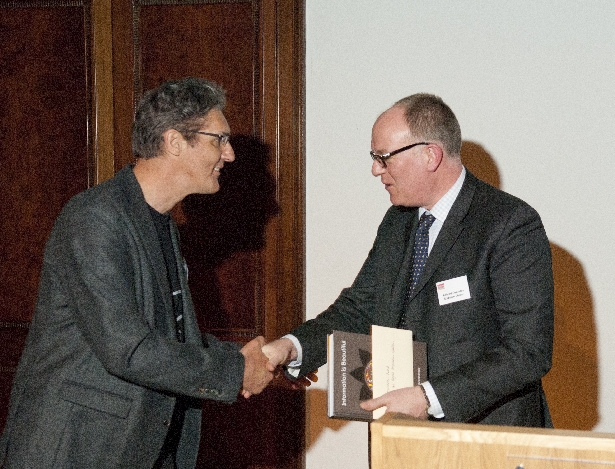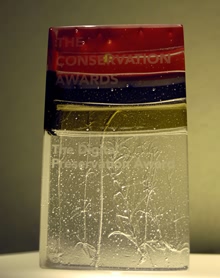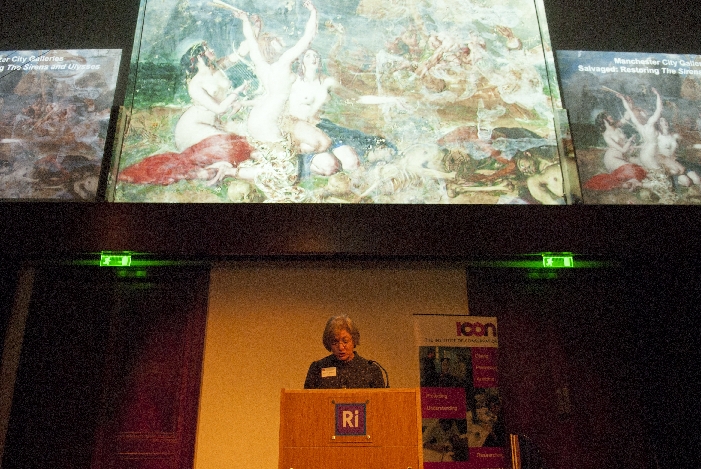In this issue:
- What's on, and What's new
- Editorial: Data Curation is for life - not just for Christmas (Joy Davidson, DCC Associate Director)
- The Awards: Announcing the Winner of the Digital Preservation Award 2010,
- Interviews with the winner and the runners up about their projects: Memento, PLATO, Preserving Virtual Worlds and Web Continuity
- Your view: Commentary, questions and debate from readers
What's on:
What’s coming up?
The DCC ran a number of events in December that may be of interest to you. For further details on any of these, please see our DCC events listings at http://www.dcc.ac.uk/events/. You can also browse through our DCC events calendar to see a more extensive list of both DCC and external events.
The Value of Shared Access and Reuse of Publicly Funded Scientific Data, 1 December 2010
http://www.nationalacademies.org/brdi
This public symposium will look at some of the research, economic, and social benefits that can be derived from providing online access to publicly-funded scientific data, as well as how such benefits can be evaluated, with a view to adding to that inquiry. The event will include presentations on the scientific data sharing and reuse policies of the federal government; compelling examples of the value of free online access and unfettered reuse of data; methods of assessing the value and effects of research, the economy, and society; and comments by Board members. The event will be webcast for those who cannot attend in person.
JISC Advance - Digital Media and Copyright Seminar 2 December 2010
http://www.jiscdigitalmedia.ac.uk/training/
Bringing together experts in digital media and copyright law this seminar created by the JISC Advance services, JISC Digital Media and JISC Legal, uses common real-world scenarios to focus on how copyright impacts on the use of digital media. The seminar will allow participants to gain an understanding of the common issues and challenges facing institutions in the current copyright landscape.
6th International Digital Curation Conference: Participation and Practice: Growing the Curation Community through the Data Decade, 6-8 December 2010
http://www.dcc.ac.uk/events/conferences/6th-international-digital-curation-conference
Digital curation manages, maintains, preserves, and adds value to digital data throughout the lifecycle, reducing threats to long-term value, mitigating the risk of digital obsolescence and enhancing usefulness for research and scholarship. This year’s International Digital Curation Conference (IDCC) will be presented jointly by the Digital Curation Centre, UK and the Graduate School of Library and Information Science, the University of Illinois at Urbana-Champaign, and in partnership with the Coalition for Networked Information (CNI).
Introduction to the Data Curation Profile 6 December 2010
http://www.dcc.ac.uk/events/conferences/6th-international-digital-curation-conference/workshops
This workshop will introduce participants to the Data Curation Profile as a tool, discussing how it was developed, and its components and explore how completed profiles could be used for individual, institutional, and research purposes.
Digital Curation 101 Lite, 6 December 2010
http://www.dcc.ac.uk/events/conferences/6th-international-digital-curation-conference/workshops
Earlier this year the National Science Foundation (NSF) announced that it plans to mandate the provision of a 2-page data management plan with all new funding applications. The NSF are not alone in their efforts to improve accountability for data management and we are starting to see Research Councils and funding bodies around the world seek evidence that adequate and appropriate provisions for data management and curation have been considered from the outset of any new funded activity. The DCC’s Digital Curation 101 Lite workshop will provide researchers with an overview of the key issues they need to consider and help them to develop and implement sound data management and curation plans.
Improving researchers’ competency in information handling and data management through a collaborative approach, 6 December 2010
http://www.dcc.ac.uk/events/conferences/6th-international-digital-curation-conference/workshops
This workshop will provide an overview of current activity in identifying and aligning data management and curation skills across a range of disciplines. A key goal of the workshop will be to investigate ways of ensuring that data management skills are ultimately recognised and endorsed by disciplinary training providers, professional bodies and industry.
Scaling-up to Integrated Research Data Management, 6 December 2010
http://www.dcc.ac.uk/events/conferences/6th-international-digital-curation-conference/workshops
The purpose of this workshop is to explore a variety of issues relating to scale and integration in terms of research data management from science being conducted at local bench top level to large-scale facilities. The workshop will be of relevance to a variety of stakeholders interested in ways to improve research data management over differing scales of science and across organisational boundaries; this includes individual research scientists and large-scale facilities managers, as well as computing services and funding agencies.
CURATEcamp: An Unconference on Digital Curation, 6 December 2010
http://www.dcc.ac.uk/events/conferences/6th-international-digital-curation-conference/workshops
CURATEcamp is an opportunity to build a community of practice around curation tools, which bridges system-specific gaps that have formed in the community. It will encourage discussion about curation tools and practices across software-, project-, and institution-specific boundaries, and attempt to identify best practices and points of collaboration across these boundaries.
IEEE e-Science 2010 Conference, 7-10 December 2010
Scientific research is increasingly carried out by communities of researchers that span disciplines, laboratories, organizations, and national boundaries. The e–Science 2010 conference is designed to bring together leading international and interdisciplinary research communities, developers, and users of e–Science applications and enabling IT technologies. The conference serves as a forum to present the results of the latest research and product/tool developments and to highlight related activities from around the world.
Fedora UK and Ireland User Group meeting, 13 December 2010
The meeting is open to any Fedora users (or potential users) in the UK, Ireland or mainland Europe subject to a limit of approximately 30. Please reply to the Fedora-UKI list (This email address is being protected from spambots. You need JavaScript enabled to view it.) if you hope to attend.
What's New?
For more information on any of the items below, please visit the DCC website at http://www.dcc.ac.uk.
Surf checklists and guidelines on selection and retention of research data
The quantity of research data continues to grow. Because of this increasing volume of data, it is important to know how long researchers and institutions want it to be preserved. Just as important is knowing what data is worth preserving. To help researchers decide, general guidelines have been drawn up for selecting the relevant information. The guidelines are based on three studies – from the perspective of three separate scientific/scholarly disciplines – that were commissioned by SURFfoundation and that looked at how researchers deal with research data and how they store and share it.
ISO Digital records preservation - Where to start guide
http://isotc.iso.org/livelink/livelink?func=ll&objId=8800112&objAction=browse&sort=name
The ISO working group responsible for Records Management Digital Records Preservation have produced a handy guide introducing digital preservation issues and providing tips on developing a preservation plan.
LoC Digital Preservation newsletter
http://www.digitalpreservation.gov/news/newsletter/201011.pdf
The November 2010 issue of the Library of Congress Digital Preservation newsletter is now available.
Open University opens up access to online data as part of the Linked Open Data Movement.
The JISC-funded OU’s LUCERO (Linking University Content for Education and Research Online) project has enabled information stored across many of the Open University’s websites to be brought together in a common, openly accessible location: data.open.ac.uk.
D-Lib Magazine
The November/December issue of D-Lib Magazine is now available. This issue contains four articles, an opinion piece and a conference report. Also in this issue you can find the 'In Brief' column, excerpts from recent press releases, and news of upcoming conferences and other items of interest in 'Clips and Pointers'.
PREMIS Data Dictionary available in Spanish
http://www.loc.gov/standards/premis/PREMIS_es.pdf
A Spanish translation of the full PREMIS Data Dictionary for Preservation Metadata, version 2.0 is now available.
Merger of National Archives of Scotland and General Register Office for Scotland
http://www.gro-scotland.gov.uk/aboutgros/merger-with-national-archives-of-scotland.html
The NAS-GROS merger builds on existing close working relationships between the two bodies, particularly the service for family history under the highly successful ScotlandsPeople brand. This grew from the idea that the public understood little and cared less about organisational differences; what they wanted was access to information through one portal.
 Editorial: Data Curation is for Life, not jusy Christmas (Joy Davidson, DCC)
Editorial: Data Curation is for Life, not jusy Christmas (Joy Davidson, DCC)
Lord Young landed himself in hot water a few weeks ago when he stated that the vast majority of Britons have ‘never had it so good’. The validity of this statement is debatable. However, with respect to the investment into supporting and improving data management and curation within UK HEIs, we really have never had it so good.
Over the last few years we’ve seen significant funding made available to help raise awareness of data management and curation issues and to develop and implement pilot services and infrastructures to support it institutionally. We’re now starting to see some very promising outcomes as a direct result of this investment. For example the JISC 07/09 projects are starting to yield very impressive results and have also been able to identify concrete benefits to be gained from undertaking data management and curation activity .
While the Full Economic Costing (FEC) contributions that are required to supplement external funding demonstrates that UK HEIs recognise the potential value of their data and their interest in supporting its management and curation, most of the current data management and curation activity depends on external funding. However, the looming economic constraints facing us all will likely lead to a reduction in the external funds available to support institutional data management and curation activities. The question now is whether institutional support will wane as the external funding dwindles. Indeed, it will be very difficult to justify the allocation of funds to what is still viewed by many as an optional activity when members of staff are facing redundancy. As a result, the sustainability of these fledgling data management and curation services and supports may be at risk.
While it may be relatively easy to secure participation from all of the relevant stakeholders during the pilot phase of such activities, it can be significantly more challenging to retain active participation levels once the funding has stopped and the day-to-day pressures of individual workloads take their toll. In many ways, our fledgling data management and curation pilots are like puppies bought as Christmas presents. Sure, everyone is delighted with a puppy on Christmas day but as the little ball of fluff matures into a gangly adolescent with quirky habits and perpetual demands – both in terms of money and effort - their adoptive families can start to question the soundness of their decision. As vet bills and food costs mount and owners face the prospect walking the dog on yet another cold, dark and rainy January morning the novelties having a dog can start to wear a little thin. In many cases, the owners feel completely overwhelmed and many of these dogs end up being abandoned.
Are we facing a similar scenario with our data management activity and support as times get tough? As the day-to-day grind of caring for our aging data kicks in will our devotion to it remain as high as it was when we were working on funded pilot projects? Only time will tell, but this festive season, I urge you all to remember that data duration is for life not just for Christmas
(Inspired by Clarissa Baldwin's 'A Dog is for life, not just for Christmas' Dogs Trust campaign: http://www.dogstrust.org.uk/az/c/clarissa/default.aspx)
 Digital Preservaion Award 2010 won by Los Alamos National Laboratory and Old Dominion University for the Memento project
Digital Preservaion Award 2010 won by Los Alamos National Laboratory and Old Dominion University for the Memento project
The Institute for Conservation and the Digital Preservation Coalition (DPC) are delighted to announce that the Memento Project led by Herbert Van De Sompel and colleagues of Los Alamos National Laboratory and Michael Nelson and colleagues of Old Dominion University, USA, has won the Digital Preservation Award 2010.
‘Memento offers an elegant and easily deployed method that reunites web archives with their home on the live web,’ explained Richard Ovenden, chair of the Digital Preservation Coalition. ‘It opens web archives to tens of millions of new users and signals a dramatic change in the way we use and perceive digital archives.’
‘The ability to change and update pages is one of the web’s greatest advantages but it introduces a sort of structured instability which makes it hard to depend on web pages in the long term. For more than a decade services like the UK Web Archive and the Internet Archive have provided a stable but partial memory of a fragment of the web – but users had no way of linking between current content and earlier versions held by web archives.’
‘The Memento project resolves this by letting users set a time preference in their browser. The underlying technology then deploys basic, under-used features of the HTTP protocol to direct users to whichever archived copy of a website most closely matches their request’.
‘The really impressive part of Memento is how it uses existing and widely deployed content negotiation tools embedded within the architecture of the web to connect users with archives’, commented Kevin Ashley, Chair of the Judges for the Digital Preservation Award. ‘Most of the technology required to make the service work is already widely deployed.’
‘The Memento architecture means you no longer need to search archives or go to a special website to recover earlier versions of pages: with Memento our archives are always, already available. The benefit for users is obvious, but in creating simple access it transforms the value and impact of web archiving. In an environment where web archives are widely used and understood, the creation of web archives will seem less like a specialised or esoteric concern.’
 ‘Winning the Digital preservation Award is a really significant achievement’, explained William Kilbride, Executive Director of the Digital Preservation Coalition which sponsored the award.
‘Winning the Digital preservation Award is a really significant achievement’, explained William Kilbride, Executive Director of the Digital Preservation Coalition which sponsored the award.
‘There is no other prize like it, so it attracts genuinely international field and is only awarded after exacting scrutiny. An expert panel subjects ensures a rigorous analysis of each nomination and the whole membership of the DPC is invited to comment on and select their favourite projects. The shortlist, which was announced in Vienna this September included two US-based projects, one Trans-Atlantic blue ribbon task force, a pan European project and an initiative from the National Archives in the UK which gained a huge amount of press attention at the time of the General Election.’
‘To have won the Digital Preservation Award in the context of so many strong candidates should be taken as a significant mark of esteem from colleagues and peers.’
The Digital Preservation Award is one of five awards organised by a working party of the Institute for Conservation (ICON), known collectively as The Conservation Awards. Each award celebrates different aspect of the highest standards of conservation skills, innovation and research, collections care and digital preservation. The Awards, which were launched in 1991, are supported by Icon and sponsored by The Pilgrim Trust, the Digital Preservation Coalition (DPC), and the Anna Plowden Trust. Since 2005, the Awards have also been generously supported by Sir Paul McCartney.
Alison Richmond, ICON CE, commented: ‘In today’s current difficult economic climate, with many of our cultural heritage organisations under threat, it is incredibly important to celebrate the outstanding quality of current conservation and research being undertaken in Britain and further afield today. The winning projects clearly demonstrate that conservation of our cultural is not an end in itself, but a passport to wider access, and deeper knowledge and enjoyment of our heritage. ’
 The Awards were presented at a ceremony followed by a drinks reception and held at the Royal Institution of Great Britain, London on 1 December 2010. Roy Clare (CEO of the Museums Libraries and Archives Council), speaking at the awards, said: ‘The art and science of conservation are vital to sustaining public understanding and enjoyment of cultural heritage and collections of all kinds, for this and future generations. The profession faces growing demands to respond openly and ever-more creatively to new standards, technologies, public expectations and resource constraints. The context is challenging, but I welcome ICON’s determination to work with members and partners to shape effective strategies for ensuring a vibrant future for conservation.’
The Awards were presented at a ceremony followed by a drinks reception and held at the Royal Institution of Great Britain, London on 1 December 2010. Roy Clare (CEO of the Museums Libraries and Archives Council), speaking at the awards, said: ‘The art and science of conservation are vital to sustaining public understanding and enjoyment of cultural heritage and collections of all kinds, for this and future generations. The profession faces growing demands to respond openly and ever-more creatively to new standards, technologies, public expectations and resource constraints. The context is challenging, but I welcome ICON’s determination to work with members and partners to shape effective strategies for ensuring a vibrant future for conservation.’
Meet the winners and runners up
Interview with Herbert Van De Sompel about the Memento Project for Digital Preservation Award 2010 from William Kilbride on Vimeo.
Interview with Hannes Hulovits and Christoph Becker about the PLATO 3 project for Digital Preservation Award 2010 from William Kilbride on Vimeo.
Interview with Jerry McDonough of Preserving Virtual Worlds Project for Digital Preservation Award 2010 from William Kilbride on Vimeo.
Interview with Amanda Spencer of The National Archives about Web Continuity, shortlisted for the Digital Preservation Award 2010 from William Kilbride on Vimeo.
We regret that no interview is available for the Blue Ribbon Task Force 'Sustainabile Economics for a Digital Planet: Ensuring Long-term Access to Digital Information which was also shortlisted for the prize. We recommend that you read the report instead.
Compiled by William Kilbride.
What's new is a joint publication of DPC and DCC.
































































































































Read more...